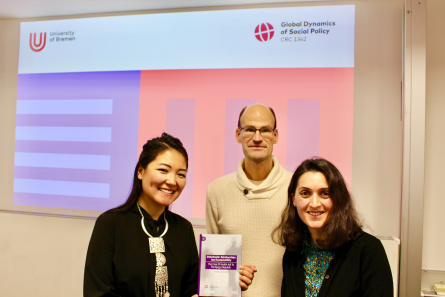
Gulnaz Isabekova, research fellow in project B06 "Resource Boom and Social Policy in Authoritarian Regimes. A Means of Securing Regime Stability?, presented her book "Stakeholder Relationships and Sustainability. The Case of Health Aid to the Kyrgyz Republic" on November 24, 2023.
Most programs financed by development assistance are not sustainable beyond the end of project-related funding, and health aid is not an exception to this tendency. Among others, major issues are the duplication of efforts, limited account for the local context, and exclusion of aid recipients from the planning and implementation of programs. Multiple international agreements have tried to address these issues by improving the relationships between the providers and recipients of development assistance. This book aims to analyze the impact of relationships between stakeholders on the sustainability of health aid using the example of two health programs in the Kyrgyz Republic. This country is the only one in the Eastern Europe and Central Asia region and one of the few in the world to have fully implemented the sector-wide approach to health aid. Guided by the national policy and procedures of the aid-recipient government (and not the providers) in a given sector, this approach aims to ensure the sustainability of aid, whose objectives and means are driven by recipients.
Focusing on health projects financed by the Global Fund to Fight AIDS, Tuberculosis and Malaria (the Global Fund) and the Swiss Agency for Development and Cooperation (SDC), this book makes the following theoretical and empirical contributions: First, it vividly demonstrates the changing power dynamics between providers and recipients of aid and offers a new or sector-specific perspective on aid dependency. Second, it identifies specific mechanisms through which the relationships between stakeholders affect the sustainability of health aid and its individual components. It argues for an asymmetrical causal relationship between the two phenomena, suggesting that the type of relationship and not the frequency of interactions matters to the sustainability of aid. Third, from an empirical perspective, this book contains unique primary material and thus offers new knowledge of development assistance in the region, which is mostly neglected in development studies.
Although context-specific, the analysis of two projects in Kyrgyzstan nevertheless demonstrates the issues common to other developing countries, distressed by the shortage of finances and human resources. The empirical and theoretical findings of this book expand on the structural issues and opportunities for the sustainability of health aid. This knowledge is critical to the ongoing and completed health projects, particularly in the context of the COVID-19 pandemic, which increased the burden on health care systems and external assistance. For this reason, the findings of this book will benefit not only academics but also practitioners working in development assistance for health in Kyrgyzstan and beyond.
Major findings of this book were presented and discussed on 24 November 2023 at the University of Bremen, with the possibility to join this event both on- and offline. Further details may be found here.
Before joining the CRC 1342 “Global Dynamics of Social Policy” in 2018, Gulnaz Isabekova was part of the Marie Skłodowska-Curie Actions Innovative Training Network project “Around the Caspian.” Gulnaz was also a country coordinator for Kyrgyzstan for the Varieties of Democracy (V-Dem) project based at the University of Gothenburg in Sweden. She participated in several research projects organized by the American University of Central Asia, the Norwegian Institute of International Affairs, UNESCO, the AIDS Foundation East-West in the Netherlands, and the ongoing research by Winrock International. Prior to her work in academia, Gulnaz worked as a project manager and specialist in the private and nonprofit sectors.
Publications:
Heinrich, A. and Isabekova, G. (2023). Multidrug-Resistant Tuberculosis in the Post-Soviet Region. A Tale of Vulnerability through Labor Migration. In: Mossig. I. and Obinger, H. (Eds.). Mapping Global Dynamics of Social Policy (pp. 56-59). Uni-Druckerei Bremen. ISSN (Online) 2629-5741.
Isabekova, G. (2022). Treatment at risk: issues and opportunities for access to tuberculosis treatment in Armenia. In: I. Ilja Michels, H. Stöver and D. Deimel (Eds.), Drug Cultures and Policy in Germany, Central Asia and China, Nomos, 237-257.
Heinrich, A., Isabekova. G., Müller, A., Pleines, H. (2022). Causal mechanisms in the introduction of mandatory health insurance in the post-Soviet region. In: J. Kuhlmann and F. Nullmeier (Eds.), Causal Mechanisms in the Global Development of Social Policies, Palgrave Macmillan 141-165.
Isabekova, G. (2020). Mutual learning on the local level: The Swiss Red Cross and the Village Health Committees in the Kyrgyz Republic. Global Social Policy 21(1), 117-137.
Isabekova, G. and Pleines, H. (2020). Integrating development aid into social policy: Lessons on cooperation and its challenges learned from the example of health care in Kyrgyzstan. Social Policy & Administration, online first.
Isabekova, G. (2019). The Contribution of Vulnerability of Labour Migrants to Drug Resistance in the Region: Overview and Suggestions. European Journal of Development Research 31, 620-642.
Isabekova, G. (2019). Diverse health care developments: the role of national and international actors. In S. An, T. Chubarova, B. Deacon, P. Stubbs (Eds.), Social policy, poverty and inequality in Central and Eastern Europe and the former Soviet Union (pp. 235-260). Ibidem Press. ISBN-13: 978-3-8382-1308 Add to Citavi project by ISBN-87.
Contact:
Dr. Gulnaz Isabekova













